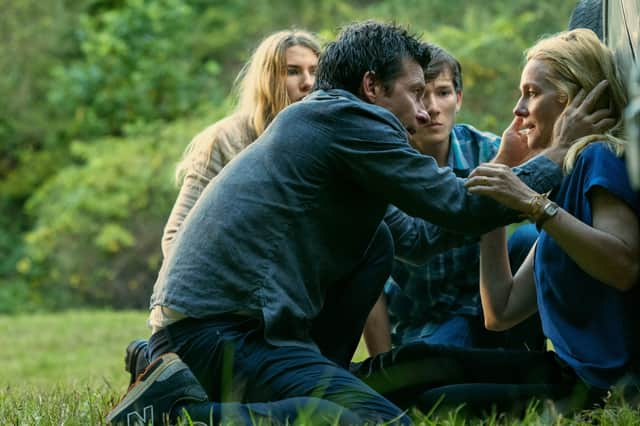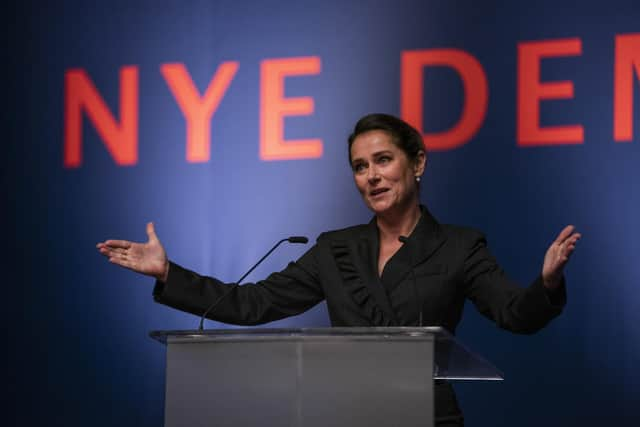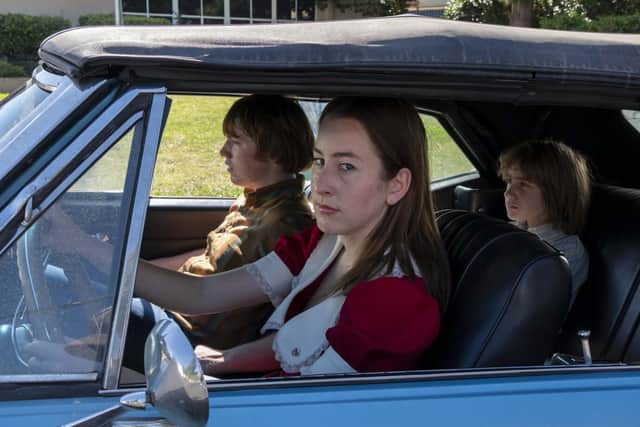Holiday viewing: The best films & TV series to watch this summer


TV SERIES
Ozark (Netflix)
It’s the end for Ozark and what a wild ride this has been. Jason Bateman and Laura Linney are back in Chicago from where they fled five years ago, unaware just how far they would be able to take the tale of a financial adviser and his wife fleeing to Missouri’s “redneck riviera” after her cheating and his scamming – and how successfully they’d shrug off comparisons with Breaking Bad to become the stars of a great show in its own right. In this final series, Marty and Wendy Byrde are trying to put behind them the drugs, the money laundering and the 223 deaths for which they’ve been at least partly responsible. Almost right away there’s the 224th, which complicates the exit strategy, so they blitz the hotel minibar and pick over old sores. “You suggested this life,” accuses Wendy. “We chose it together,” insists Marty, “you were excited by it.” AS


Winning Time: The Rise of the Lakers Dynasty (Sky Atlantic)
If you know your slam-dunk, the title of Winning Time: The Rise of the Lakers Dynasty tells you that Sky Atlantic’s series concerns the La-La Land luvvy-endorsed team from Los Angeles and Magic Johnson. I came to it from Don’t Look Up, the knockabout movie about the end of the world directed by Adam McKay and he’s responsible for the similarly buzzy, frantic, cut-up images here. It’s like he shot Winning Time while sooking Sherbet Fountains – or maybe something stronger – as he listened to early DJ Shadow albums. This is a big, crazy, lurching sprawl of a drama totally at odds with the tight, quick play on a basketball court. AS
Euphoria (Sky Atlantic)
Advertisement
Hide AdBack for a second season of American teen excess, Euphoria is the kind of show that prompts parents to press pause and ask: “When’s our daughter going to that house party again?” You feel like a proper old fart by wondering of Rue, Jules, Cassie, Maddy and Cat: “Do their mothers know they’re out?” Then the urgent supplementary: “How’s school going, girls – anyone read a good book recently or indeed anything at all?” Rue and Jules have had moments of clarity, reflection and tenderness in the past and probably will again, but the series opener is mostly about the latest kerayzee house party, with kerayzee-est of all Cassie (Sydney Sweeney) reduced to hiding in the bath following her latest “did-she-just-do-that” moment. AS


Borgen (Netflix)
When Borgen ended nine years ago I was glad. Sad but glad. Like the immaculate Danish furnishings, like the immaculate Danish prime minister Birgitte Nyborg, it was perfect. And three seasons seemed perfect. But the political drama has returned and I’m shouting: “What kept you, Birgitte? Where have you been?” Because Borgen still grips. Nyborg, played by Sidse Babett Knudsen, is not PM anymore but Foreign Secretary in a coalition. The PM is young, and on the early evidence, charmless. Nyborg is frustrated. By the boss calling a press conference for the same time as her. By her new aide faffing and getting her title wrong (where’s Kasper?). “Her time is over. Most people have forgotten her,” mutters a rival. Wrong, so wrong. Nyborg declares: “No kids at home, no husband feeling neglected, I’m having the time of my life.” AS
Cheaters (BBC)
Cheaters is a drama for these times, coming in nibble-sized episodes, perfect for the swipers and flickers and easily-distracted. It begins in Finland with a grounded plane (“The wrong kind of snow”). There’s an airport altercation between two of the disgruntled passengers, Josh and Fola, who then find themselves stuck at the hotel bar together. But in no time – because each instalment lasts just ten minutes – they’re tumbling into bed. Writer Oliver Lyttleton took Josh to Oslo to clear his head after his girlfriend cheated while Fola was on a work trip. Oh, and she’s married. Then Lyttleton has them meeting again, horror-filled, as they return home to the same street. Fola has just moved there. “It’ll be fine,” says Josh. “No one knows their neighbours anymore.” Maybe not in London, but then Fola’s husband Zack, who’s American, invites the seemingly-reconciled Josh and Esther to a party. AS
FILMS
Licorice Pizza (15)
Set on the fringes of LA’s entertainment industry circa 1973, Paul Thomas Anderson’s first film since Phantom Thread is a freewheeling coming-of-age comedy drama that serves up a wondrous meditation on first love, obsession and the hucksterism of adolescence. Eschewing nostalgia for something a little more truthful, the film takes shape around a 15-year-old high school student and the 25-year-old photographer’s assistant he becomes fixated on. The former is the wonderfully named Gary Valentine, a fast-talking teen with some child-acting credits to his name and an unerring belief that he’s the centre of the universe (he’s played with extraordinary confidence by Cooper Hoffman, son of Anderson’s late, great collaborator Philip Seymour Hoffman). When he meets Alanah (Alanah Haim), he knows in an instant that he wants to be in her orbit too and makes a relentless play for her affections, despite her very clear insistence as a woman in her mid-20s that she has no interest in a dating a high school kid. But there is something intriguing about Gary; in some respects he’s more grown-up than her and Anderson gradually makes Alanah the subject of the film’s coming-of-age narrative while focusing in turn on how Gary has to negotiate that early moment in a precocious kid’s life where the person you’re going to be really starts taking root. AH
Kimi (15)
There has been a raft of movies reflecting our recent lockdown experiences, but Steven Soderbergh’s latest film Kimi is the first major one that’s actually good. Zoe Kravitz takes the lead as Angela Childs, an analyst for a tech start-up that’s about to go public with the eponymous Kimi, an AI-powered digital assistant designed to rival Alexa and Siri, but differing in that the company uses people rather than algorithms to monitor errors and help it learn. Angela is one such employee and she spends her days in her expansive Seattle loft listening to streams of data, correcting miscommunications, and occasionally interacting with fellow work-at-home colleagues on Zoom. But Angela is also suffering from trauma-induced agoraphobia, and the hard angles of her industrial windows are a frequent reminder of her self-imposed confinement. It’s an elegant way of setting up the parameters of Angela’s world and he uses it to ratchet up the tension as the plot kicks in. That happens when Angela hears a crime being committed on one of the data streams. When she tries to report it, her line manager doesn’t want to know, but as her report gets kicked up the corporate ladder, a world of trouble inevitably awaits. What follows is a brilliantly slick and efficient paranoid conspiracy thriller. AH
Jackass Forever (18)
It’s been 20 years since Jackass: The Movie brought the MTV-backed reality stunt-show insanity of Johnny Knoxville and his cackling crew of masochistic clowns to the big screen. Two decades on, the sight of those same now-very-middle-aged men delighting in their own dumb debauchery remains indecently funny. Having elevated idiocy to the level of performance art across three previous movies, Jackass Forever doesn’t mess with the formula: there’s no plot, no script, just a series of don’t-try-this-at-home skits involving the original crew (and a few younger acolytes) subjecting their bodies to ever-more silly and painful-looking feats of slapstick derring-do. Once again, the guiding hand of maverick filmmaker and Jackass co-creator/executive producer Spike Jonze remains key to the series’ ongoing appeal, adding a kind of gonzo surrealism to proceedings that’s especially evident in the ludicrous opening credits sequence: a Japanese monster movie parody in which the Godzilla-style beast is revealed to be… well, let’s just say a member of the Jackass crew makes the first of many cameos. AH
The Bad Guys (U)
Advertisement
Hide AdLike an animated-riff on Ocean’s Eleven, The Bad Guys has been conceived as a family friendly heist movie that smartly uses all the con artist tropes to deliver an amusing message about not judging books by their covers. Its simple-yet-amusing premise is to make its titular crew of criminals the sorts of anthropomorphised characters forever stigmatised as the villains in kids’ picture books. Led by a big bad wolf named simply Mr Wolf (charmingly voiced by Sam Rockwell), they’re a squabbling band of misfits united by their status as social pariahs. Thus we have the tetchy, safe-cracking Snake (comedian Marc Maron); the tech-savvy Tarantula (Awkafina); the always-in-disguise Shark (Craig Robinson), and the loose-cannon Piranha (Anthony Ramos). The plot takes shape around their efforts to pull off the ultimate job, but it’s smart enough to have fun with that idea, deconstructing it in a way that’ll make sense to parents and kids alike as it delivers a fast-moving, nothing-is-what-it-seems plot about finding a way to be good in the world. AH
Worst Person in the World (15)
It’s a little hard at first to see what all the fuss is about when it comes to Norwegian director Joachim Trier’s much-hyped double Oscar nominee The Worst Person in the World. This story about a twenty-something millennial woman undergoing an existential crisis as she turns 30 doesn’t appear to be doing anything especially radical or profound. It revolves around Julie (Renate Reinsve), a medical school drop-out so overwhelmed by the anxiety of the digital age she can’t decide if she wants to be a surgeon or a psychologist so embarks on a career as an aspiring creative. Dabbling in a bit of photography and a bit of writing, she’s a gallery assistant’s job away from being a dilettante cliché. But in presenting Julie as an archetypal hot mess, Trier is also pulling a bait-and-switch to tell a more subversive story about a young woman having the courage to repeatedly pull the pin on her life with no guarantee that her choices will bring her happiness. AH
Reviews by: Aidan Smith and Alistair Harkness